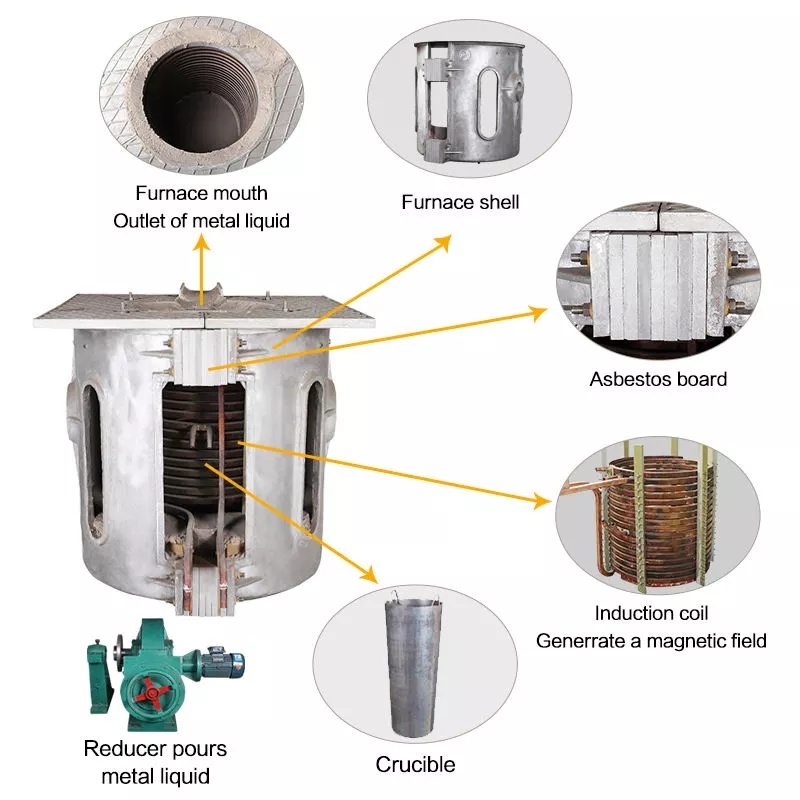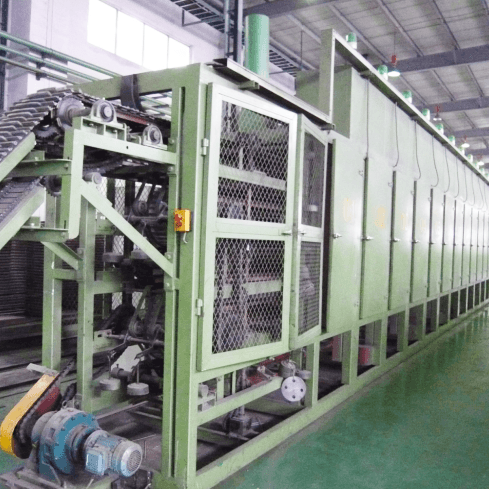What is induction furnace?
An induction furnace is a type of electric furnace that uses electromagnetic induction to melt and heat metals. It is a popular type of furnace used in many industries for its efficiency, reliability, and flexibility in melting and heating various types of metals.
History
The concept of induction heating was first introduced by English scientist Michael Faraday in the early 19th century. However, it was not until the late 19th and early 20th century that the first induction furnace was developed and used for industrial purposes. In 1890, Edward Allen Colby patented the first induction furnace, which was used to melt alloys and metals. Over the years, various improvements and advancements have been made to induction furnaces, making them an essential tool in metalworking and foundry industries.

How it works?
Induction furnaces work on the principle of electromagnetic induction. It uses an alternating electric current that creates a magnetic field inside the furnace, which induces an electric current in the metal being melted. The flow of these electric currents creates heat, which then melts the metal. The primary components of an induction furnace include the power source, the coil, the electrodes, and the crucible.
The power source for an induction furnace is usually a high-frequency generator that supplies an alternating current to the coil. The coil is made of copper and is wound into a helical shape to create an electromagnetic field. This field generates an electric current in the metal, which is placed inside the coil. The metal acts as a secondary circuit, and the induced current generates heat, melting the metal. The electrodes, usually made of graphite, are used to line the crucible and make contact with the molten metal to transfer the current and create heat.
Types of induction furnaces
There are various types of induction furnaces, each designed for specific applications. The most common types include channel type induction furnace, coreless induction furnace, and vacuum induction furnace. Channel type induction furnaces are used for melting metals with lower melting points, such as aluminum and copper. Coreless induction furnaces are used for melting ferrous metals, including iron and steel. They do not require the metal to make a complete circuit and employ a refractory crucible to hold the molten metal. Vacuum induction furnaces are used to melt reactive metals or alloys, such as titanium and nickel-based alloys, in a controlled and oxygen-free atmosphere.
Advantages of induction furnaces
Induction furnaces offer various advantages over other types of melting and heating systems. One of the most significant benefits is their energy efficiency. As the melting process is localized, and only the metal being melted is heated, there is minimal heat loss, resulting in significant energy savings. Additionally, as there are no direct contact between the heating source and the metal, there is minimal contamination of the molten metal, resulting in high-quality and pure alloys.
Induction furnaces are also more environmentally friendly as they produce significantly less emissions compared to traditional melting methods such as gas-fired furnaces. They can also be easily automated, making them suitable for mass production and reducing labor costs. They have a fast melting process, with most metals melting within minutes, increasing efficiency and productivity.

Applications
Induction furnaces are used in various industries for melting and heating different types of metals. They are commonly used in the foundry industry for melting and casting various metals, such as steel, iron, and aluminum. Induction furnaces are also used in the metal scrap industry for the recycling of metal scraps. The automotive industry also utilizes induction furnaces for the production of various components, including engine blocks, gears, and brake discs.
Shandong Kehua Intellient Equipment, located in the picturesque city of Weifang, Shandong Province. With superior geographical location and convenient transportation network, it is a production-oriented enterprise that integrates scientific research, production, sales, and service. Our products have a wide variety, such as water-cooled pumps,melting furnace,elevator furnaces,intelligent mobile bottom furnaces,smelting furnaces,tube furnaces,heat treatment furnace,high-temperature furnaces,electric furnaces, etc., with excellent quality, reasonable prices, fashionable designs, and are widely used in industries such as construction, metal casting and forging, heat treated glass, semiconductor material production, and ceramic manufacturing.
We have modern infrastructure and professional personnel who can help us develop testing equipment based on the specific requirements of our customers. By controlling, inspecting, and improving the optimization quality mechanism of our products, we ensure the excellent performance and accuracy of our product line. The company has passed ISO9001 quality certification and CE certification.

What is the principle behind induction furnaces?
The principle behind induction furnaces is electromagnetic induction, which is the process of creating an electric current in a conductor by varying the magnetic field around it. Induction furnaces use this principle to heat and melt a material, such as metal, by passing it through a high-frequency alternating magnetic field. This alternating magnetic field induces eddy currents in the material, which generates heat due to the resistance of the material. This heat is then used to melt the material and maintain its molten state. This principle allows for a fast and efficient heating process, making induction furnaces commonly used in the melting and casting of metals.














